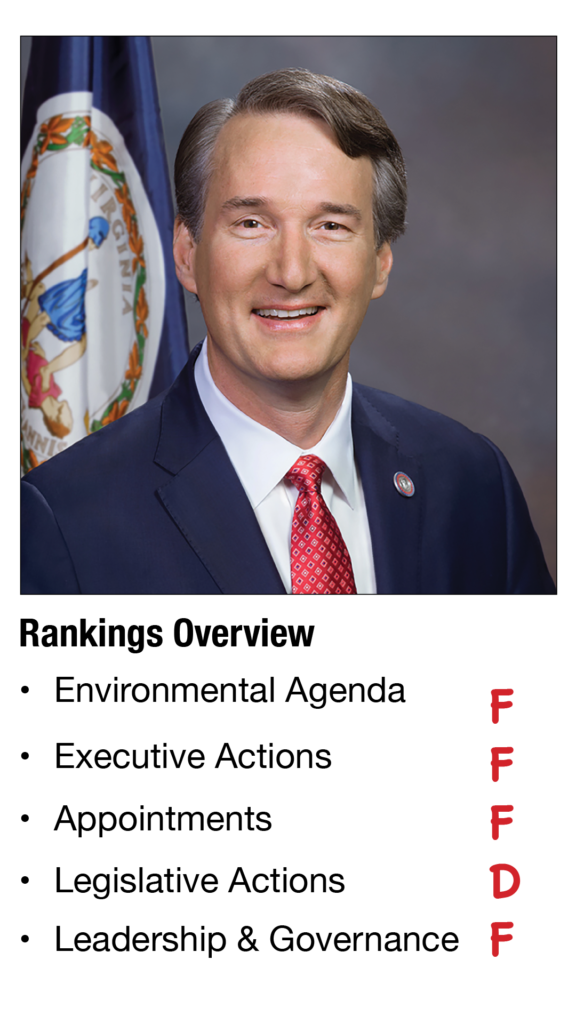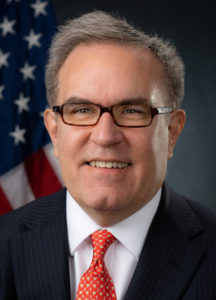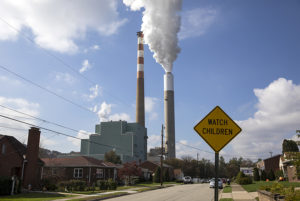 In his first few months on the job, Governor Glenn Youngkin (R) has done little to advance environmental protection, focusing instead on rolling back important environmental safeguards, while appointing individuals with deep ties to the fossil fuel industry to his administration and to important regulatory posts.
In his first few months on the job, Governor Glenn Youngkin (R) has done little to advance environmental protection, focusing instead on rolling back important environmental safeguards, while appointing individuals with deep ties to the fossil fuel industry to his administration and to important regulatory posts.
Furthermore, Gov. Youngkin has shown little interest in working with the legislature to find common ground; instead he’s proven to be incredibly uncollaborative, even with members of his own party, and used the bully pulpit of his office to pick political fights, killing bipartisan legislation as retribution to the bills’ patrons, while ignoring the actual policy considerations.
With three and a half years left in his term, we sincerely hope better days are ahead. However, Gov. Youngkin’s hostility to sound environmental policy and his lack of leadership in just a short several months has earned him a grade of “F” in our first rankings of this Administration.
Environmental Agenda
Grade: F
Justification: Youngkin’s legislative agenda lacked substance, didn’t match up to statements he made on the campaign trail, and was accordingly defeated.
On the campaign trail, Youngkin gave very little attention to the environment. While acknowledging when he was forced to in a televised interview that we have a “climate challenge” and that “all living beings” play a role, he mentioned few of what could be considered environmental priorities. These included: addressing the combined sewer overflow problems that plague the James and Potomac Rivers, leading to excess pollution in these tributaries and the Chesapeake Bay that they flow into (this was the topic of a political mailer where Youngkin attacked his opponent and claimed his administration would fix this issue), and addressing flooding along the coast.
Youngkin’s 2022 legislative agenda included a bill (House Bill 847 and Senate Bill 569) that would have created the Coastal Virginia Resilience Authority to oversee the Community Flood Prevention Fund, legislation the environmental community opposed and defeated on the grounds that it created an unnecessary, duplicative and burdensome layer of bureaucracy and would have taken resources away from inland, flood-prone communities, as flooding is not just a coastal issue here in Virginia.
The Administration also pushed a bill (House Bill 1144 and Senate Bill 541) to reduce the tax levied on gas and diesel, legislation that we opposed and scored this year that would have deprived the Commonwealth of transportation and mass transit funding while returning little savings back to Virginians. Youngkin worked to push the same flawed policy through an additional bill in the special session and through the budget process (more on this below).
Take Action: Tell Governor Youngkin failing on the environment is unacceptable
Executive Actions
Grade: F
Justification: All four of Youngkin’s Executive Actions dealing with the environment would take us in the wrong direction on clean air, clean water and a safe and healthy environment.

RGGI
On his first day in office, Gov. Youngkin issued Executive Order 9, instructing his agencies to“evaluate Virginia’s participation in the Regional Greenhouse Gas Initiative and immediately begin regulatory processes to end it.” This directive, in and of itself a foregone conclusion to what would come next, led to a hastily prepared report overlooking the many benefits of RGGI to Virginia and calling for the repeal of regulations to comply with this proven cap-and-invest program, which is returning hundreds of millions of dollars in revenue to the state each year to protect communities from the impact of flooding and sea level rise, and to lower the energy burden for our state’s lowest income residents.
Plastics
In April, Gov. Youngkin issued Executive Order 17, overturning a previous Executive Order that instructed state agencies and higher education institutions to reduce their use of single-use plastics, while calling for the need for increased recycling and waste reuse – a worthy goal but counterintuitive in an Executive Order that will result in more plastic waste in our natural environment. Overall, this is a dangerous back-peddling of sound policy intended to protect our environment and health from the danger of plastic pollution.
Regulatory Rollbacks
In his Executive Order 6, Youngkin claims that “excessive regulation imposes a significant burden on Virginia’s economy,” despite the fact that we were named America’s Top State for Business by CNBC in 2021, going on to direct all Executive Branch entities under his authority to “initiate regulatory processes to reduce by at least 25 percent the number of regulations not mandated by federal or state statute.” The underpinning of this Executive Order was 2018’s House Bill 883, legislation that Virginia LCV opposed on several grounds. First, it presented an unnecessary obstacle to the current implementation of rules and regulations that protect public health and the environment; secondly, expert agencies are using sound science and decades of data to develop rules and regulations, and obstructing this process is counter productive; and finally, rules and regulations are already reviewed every few years to ensure that they are working so this legislation wasn’t needed in the first place.
On June 30, Youngkin followed up on this order by issuing Executive Order 19 establishing an Office of Regulatory Management tasked with meeting the arbitrary 25-percent benchmark of regulatory reduction.
Appointments
Grade: F
Justification: While there are some sensible, respected appointments on this list, Wheeler’s initial nomination to the Secretariat and his subsequent appointment to a new post tasked with cutting regulations justifies a grade of “F.”

Andrew Wheeler,
Secretary of Natural and Historic Resources
Head of the Environmental Protection Agency under former President Trump, and before that a coal lobbyist, Wheeler built his career around gutting environmental laws and maximizing windfalls for big polluter industries at the expense of our health, and the health of our environment, making him one of the worst picks for this post in our Commonwealth’s history.
After the legislature rejected this appointment, Youngkin selected Travis Voyles for this post; he now serves as Acting Secretary, until he can be confirmed by the legislature. Hardly the lightning rod that Wheeler is, Voyles most recently served as Oversight Counsel for the U.S. Senate Committee on Environment and Public Works under Sen. Shelley Moore Capito (R-W.Va.). To date, this Secretariat’s office remains well under-staffed, with no announcements of additional personnel.
Despite having his appointment defeated, Wheeler remained in the Youngkin Administration, first as a Senior Advisor, advising the Governor on environmental policy, and even appearing in lieu of the Acting Secretary for official business and meetings with stakeholders, and now as the leader of a new Office of Regulatory Management tasked with cutting state regulations by 25 percent.
Matthew Lohr,
Secretary of Agriculture and Forestry
A member of the House of Delegates from 2006-2010, Lohr, a Republican, earned a career score of 39 percent from Virginia LCV for his time in office. Lohr was commissioner of Virginia’s Department of Agriculture and Consumer Services under Gov. Bob McDonnell; most recently Lohr served as Chief of the USDA-Natural Resources Conservation Service in the Trump Administration. Lohr is a fifth-generation farmer on a century farm and a native of the Shenandoah Valley. Lohr is considered qualified for this post and was a fairly non-controversial choice for Youngkin’s cabinet, and many in the conservation community have a good working relationship with him.
Michael Rolband,
Director, Department of Environmental Quality
Rolband founded Wetland Studies and Solutions Inc. in 1991, is a well-known figure on stormwater management and water quality issues and has helped shape water quality policy in Virginia for a number of years. His appointment was both praised by some in the community, but also criticized for testifying in support of the Mountain Valley Pipeline. As DEQ Director he has so far issued a report on RGGI laying out the beginning of our state’s withdrawal from this program and has signaled his agency’s intent to expedite an already at times flawed permitting process. With DEQ – and not our citizen-led boards – now in charge of environmental permits, the power of this post to help or hurt our environment has increased substantially, and we will be watching the actions of DEQ closely.
Matthew Wells,
Director, Department of Conservation and Recreation
As chair of VirginiaForever, a coalition of business and environmental groups that advocates for more funding for conservation, Wells advocated for greater investments in environmental protection at the General Assembly. Although his previous position included government relations for the forestry products company WestRock, Wells is respected within the environmental space and seen as someone we can work with at this post.
Air Pollution Control Board

In May, Youngkin replaced four members of the Air Board with individuals that have one thing in common: deep ties to the fossil fuel industry, the Virginia Manufacturing Association, or the industries the Air Board would be in charge of regulating.
The appointment process itself was equally troubling. As retribution for rejecting Wheeler’s cabinet nomination, House Republicans blocked a number of outgoing Governor Northam’s appointments, including his picks for the Air Board, a move that broke precedent and gave Youngkin more appointments earlier in their administration – a move that may come back to hurt them in their last year, and forever politicize these appointments from here on out.
These include:
- James Patrick Guy II, general counsel for Mecklenburg Electric Cooperative
- Jay Holloway, managing partner with Climate Law & Strategy, PLLC; former partner at Williams Mullen where he represented the Virginia Manufacturers Association in suing over our state’s membership in RGGI
- David Hudgins, executive director for the Virginia Energy Consumer Trust, a group aligned with fossil fuel interests and the Virginia Manufacturers Association that opposes clean energy; former director of member and external relations for Old Dominion Electric Cooperative
- Donald L. Ratliff, president of consultancy Commonwealth Connections Inc., former and current coal lobbyist
State Water Pollution Control Board
In the same May decision, Youngkin re-appointed Robert “Bob” Dunn to the Water Board. A former DuPont employee, Dunn chaired the Water Board as it signed off on major permits for both the Atlantic Coast and Mountain Valley Pipelines. He left the board in 2018 when Gov. Northam declined to reappoint him to the post.
Legislative Actions
Grade: D
Justification: Actions taken into consideration include vetoes of and amendments to legislation and Youngkin’s action on the budget. While some of Youngkin’s legislative actions took us in the wrong direction, or were nonsensical and arbitrary, environmental priorities were largely spared in the state budget, including funding for the Chesapeake Bay.
At the conclusion of the 2022 Regular Session, Youngkin sent down over 100 amendments to bills, and 26 vetoes of legislation that had passed with fairly broad bipartisan support. Here are several examples that impacted environmental priorities:
Vetoes
SB 250 Nonhazardous solid waste management facilities; increases the annual fees.
This legislation would have increased solid waste fees, giving the Department of Environmental Quality, which has been woefully underfunded for years, an increased stream of revenue. It originally passed the Senate 24-16 and the Republican-controlled House 67-30-1. The Senate took no further action on the bill.
SB 278 Parking of vehicles; electric vehicle charging spots, civil penalties.
This legislation would have imposed up to a $50 fine to motorists who park non-electric vehicles in designated charging stations for electric vehicles. It passed the legislature with wide bipartisan support. Youngkin weakened the House version but vetoed this bill carried by Sen. Adam Ebbin with no explanation. The Senate voted 22-18 to pass the bill in its enrolled form, which failed to reach the two-thirds majority needed to override the veto.
SB 280 Electric utilities, certain; local reliability data provided to a locality upon request.
SB 280 would require Dominion Energy to provide requesting localities in their service territory with reliability data within 30 days of a locality making a request. Governor Youngkin vetoed this bill, also carried by Sen. Adam Ebbin, but signed its identical House companion carried by Del. Charniele Herring. The Senate voted 22-18 to pass the bill in its enrolled form, which failed to reach the two-thirds majority needed to override the veto.
SB 347 Electric utilities; SCC to establish for certain utilities annual energy efficiency savings targets.
This bill required the State Corporation Commission to establish for Dominion Energy annual energy efficiency savings targets for customers who are low-income, elderly, disabled, or veterans of military service. This legislation had passed the Senate with no objections and passed out of the House on a wide 74-24 bipartisan margin. The Senate took no further action on the bill.
SB 508 Virginia Community Preparedness Fund; shifts administration to Water and Soil Conservation Board.
This legislation would have shifted control of the Community Flood Preparedness Fund from the Department of Conservation and Recreation (DCR) to the appointed Soil and Water Conservation Board in an attempt to bring transparency to how the state manages the millions of dollars of revenue it gains from participating in the Regional Greenhouse Gas Initiative. After the Senate unanimously rejected Youngkin’s amendments to this legislation to keep DCR in charge of program administration, Youngkin vetoed the bill outright on the last day he had to act, a process termed a “pocket veto” that prevented the legislature from voting on the bill any further.
Amendments
HB 142 and SB 342 Transit Ridership Incentive Program; amount of funds to be used to establish programs.
The bill was intended to support the establishment of programs to expand ridership and reduce the impact of transit fares on low-income individuals. It passed the House 92-8 and the Senate 30-10. Youngkin’s amendments to the bill mean these programs will expire in July 2024.
HB 450 Parking of vehicles; electric vehicle charging spots, civil penalties.
Having vetoed the Senate companion bill, which was identical to the House version, Youngkin weakened this bill, lowering from $50 to $25 the civil penalty cap for parking a non-EV in an EV charging space, and complicating enforcement by making the penalty also apply to EVs that have finished charging.
HB 558 and SB 565 Natural gas, biogas, and other gas sources of energy; definitions, energy conservation.
This was legislation that Virginia LCV opposed, and Youngkin’s amendments make the bill even worse. As originally passed, the bill would let natural gas companies capture and distribute methane from sources like landfills or farm operations, expanding gas infrastructure without any assurances of actual methane reduction, all while passing costs for new infrastructure on to ratepayers. Youngkin’s amendment removes a “societal cost test” provision in the bill recognizing the negative impact of greenhouse gas emissions to society when considering cost recovery.
SB 575 DGS; state fleet managers to use total cost of ownership calculations, report.
This commonsense bill requires state agencies to take into consideration the long-term cost of ownership for light-duty vehicles, a calculation that often favors electric vehicles due to savings on maintenance and fuel over their internal combustion counterparts. Youngkin’s amendments would have weakened the bill considerably, actually limiting the Department of General Services’s ability to transition the fleet to cost-saving EVs – unintended consequences that could have made it more difficult to purchase EVs than the status quo. The Senate rejected all but one of these amendments and this bill was signed into law.
HB 1309 and SB 756 Resilient Virginia Revolving Loan Fund; created
This legislation created the Resilient Virginia Revolving Loan Fund (RVRLF) to help local governments finance important resiliency projects. The original legislation passed the Senate unanimously and cleared the House on a vote of 73-25. Youngkin introduced an amendment in the nature of a substitute that shifted oversight of the RVRLF, including decisions over which localities receive funding, how much funding is granted, and whether monies come in the form of a grant or a loan, from the citizen-led Soil and Water Conservation Board to the Department of Conservation and Recreation, consolidating control of resiliency funding within the executive branch.

State Budget
In June, after a drawn-out budget process, characterized by miscommunication and tension between the House, Senate and the Governor’s office, Youngkin sent his line-item budget amendments to the General Assembly for their consideration.
Environmental priorities from the conference report passed by the legislature were largely spared by Youngkin’s amendments, except for one issue: a proposal to suspend the 26-cent-per-gallon gas tax, which would rob Virginia of more than $900 million in transportation funding, including a $106.9 million cut for public transportation, a $32.4 million cut for passenger rail, a $730 million cut for road maintenance and construction, and nearly a $12 million cut for ports. Youngkin attempted the same policy change through legislation (SB 6001) introduced in April’s special session, which was defeated in the Senate Finance Committee.
Likewise, this amendment was defeated in the Senate with Republican Emmett Hanger voting with Democrats to kill this proposal after it had initially passed the House of Delegates on a vote of 55-41.
Had it passed, the Institute on Taxation and Economic Policy found that 30 percent of the projected “savings” from this plan would have likely flowed to oil producers, and another 24 percent to the trucking industry and out-of-state tourists. Less than one-third of the benefit from suspending the state gas tax would have actually gone back into the pockets of Virginia residents. Even if all the savings of this proposal went directly to Virginia consumers, it would only save the average driver roughly $3 a week – hardly enough to make a difference to commuter pocket books while creating a huge hole in the state budget for taxpayers to fill at a later date.
Overall, the budget was a true compromise between the Republican-led House and Democrat-controlled Senate. It largely moves the ball forward in funding for natural resources protections, with some exceptions, and is also free of language in the original House budget attacking Virginia’s ability to participate in the Regional Greenhouse Gas Initiative (it does, however, divert some one-time funding from this program to fund disaster relief in Hurley, Va. and a new resiliency fund).
(Click here for more information on how conservation priorities fared in the budget.)
Take Action: Tell Governor Youngkin failing on the environment is unacceptable

Leadership and Governance
Grade: F
Justification: In just a few short months, Youngkin’s shown a penchant for vindictiveness, political theater, leaning into divisive culture war issues, and failing to effectively communicate with the legislature to do the work of the Commonwealth.
If Governor Youngkin was actually interested in finding common ground and working with the narrowly Democratic-controlled Senate, he had the opportunity to do so by working with several swing members to advance his agenda. Instead, he came out of the gate with a number of divisive and controversial executive orders, and tapped former Trump Administration officials for key posts in his Administration, actions that were clearly in his political self-interest, not Virginians’.
Youngkin has also shown himself to be vindictive.
Nine of the 25 bills that Youngkin vetoed were bipartisan bills from Sen. Adam Ebbin (D-Alexandria) that had passed the legislature with broad support. In some cases, Youngkin even signed into law the companion legislation. As chair of the Privileges and Elections Committee, Ebbin presided over removing Andrew Wheeler from consideration for Secretary of Natural and Historic Resources, setting off a tit-for-tat over appointments with the House that led to the Senate also rejecting Youngkin’s picks for the Parole Board.
There are even reports that lawmakers of his own party had to cancel vacations to attend the start of a special session that they weren’t ready for, evidence he wasn’t even coordinating with the leaders of his own party.
With budget talks at a standstill due to differences between the House and Senate during the regular session, Youngkin caught members off guard in calling lawmakers back to Richmond for a special session on April 4, making the call via a self-funded campaign style ad, an announcement that came out while the House Chair of Appropriations, a Republican, was on vacation out of the country. With no budget deal in place, and with Youngkin even admitting to reporters he had not spoken with Democratic leaders in the Senate about the budget, lawmakers were in session for less than two hours, before negotiations returned to the budget conferees. The legislature finalized its work on the budget on June 1, nearly two months after Youngkin’s special session that was intended to speed along the process.
Several of Youngkin’s legislative actions also undermine democracy, free speech and our constitution.
Youngkin attempted to force new elections this fall for the entire Loudoun County School Board, cutting short the terms of seven of nine members, action that runs afoul of Virginia’s Constitution and feeds into a conservative “Parents’ Rights” movement in the wake of controversies surrounding how school officials handled issues of race, gender and sexual assault.
One of Youngkin’s budget amendments was even a non-starter for his own party. It would have created a felony penalty for individuals who protest outside of a court building or judge’s residence in the wake of demonstrations outside of Supreme Court Justice’s homes in Northern Virginia over a leaked ruling on abortion rights. This amendment was never taken up in the House. Youngkin had come under fire in right-wing media for not cracking down on protestors.
The lack of communication and collaboration, along with a vindictive streak, engagement in culture war, and a pursuit of headline-grabbing but empty policies undermine Youngkin’s ability to govern for the good of the Commonwealth, demonstrating more a penchant for political theater and headlines than in actual results that improve the lives of Virginians.


